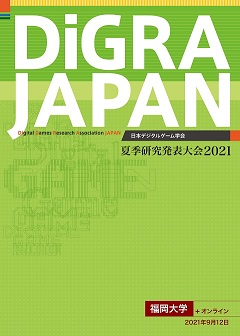2021 Summer Conference
Displaying 1-37 of 37 articles from this issue
- |<
- <
- 1
- >
- >|
Front matter
-
Pages 0-
Published: 2021
Released on J-STAGE: March 08, 2023
Download PDF (286K) -
Pages 0-
Published: 2021
Released on J-STAGE: March 08, 2023
Download PDF (307K) -
Pages 0-
Published: 2021
Released on J-STAGE: March 08, 2023
Download PDF (122K) -
Pages 0-
Published: 2021
Released on J-STAGE: March 08, 2023
Download PDF (311K)
Oral session
Serious game ( session 1 )
-
Article type: Conference Paper
Session ID: 1-1
Published: 2021
Released on J-STAGE: March 08, 2023
Download PDF (647K) -
Article type: Conference Paper
Session ID: 1-2
Published: 2021
Released on J-STAGE: March 08, 2023
Download PDF (1238K) -
Article type: Conference Paper
Session ID: 1-3
Published: 2021
Released on J-STAGE: March 08, 2023
Download PDF (552K)
Game play ( session 2 )
-
Article type: Conference Paper
Session ID: 2-1
Published: 2021
Released on J-STAGE: March 08, 2023
Download PDF (625K) -
Article type: Conference Paper
Session ID: 2-2
Published: 2021
Released on J-STAGE: March 08, 2023
Download PDF (682K) -
Article type: Conference Paper
Session ID: 2-3
Published: 2021
Released on J-STAGE: March 08, 2023
Download PDF (584K)
e-Sports ( session 3 )
-
Article type: Conference Paper
Session ID: 3-2
Published: 2021
Released on J-STAGE: March 08, 2023
Download PDF (788K) -
Article type: Conference Paper
Session ID: 3-3
Published: 2021
Released on J-STAGE: March 08, 2023
Download PDF (768K)
Gamification ( session 4 )
-
Article type: Conference Paper
Session ID: 4-1
Published: 2021
Released on J-STAGE: March 08, 2023
Download PDF (986K) -
Article type: Conference Paper
Session ID: 4-2
Published: 2021
Released on J-STAGE: March 08, 2023
Download PDF (493K) -
Article type: Conference Paper
Session ID: 4-3
Published: 2021
Released on J-STAGE: March 08, 2023
Download PDF (661K)
Education ( session 5 )
-
Article type: Conference Paper
Session ID: 5-1
Published: 2021
Released on J-STAGE: March 08, 2023
Download PDF (690K) -
Article type: Conference Paper
Session ID: 5-2
Published: 2021
Released on J-STAGE: March 08, 2023
Download PDF (539K) -
Article type: Conference Paper
Session ID: 5-3
Published: 2021
Released on J-STAGE: March 08, 2023
Download PDF (661K)
Game design ( session 6 )
-
Article type: Conference Paper
Session ID: 6-1
Published: 2021
Released on J-STAGE: March 08, 2023
Download PDF (605K) -
Article type: Conference Paper
Session ID: 6-2
Published: 2021
Released on J-STAGE: March 08, 2023
Download PDF (716K) -
Article type: Conference Paper
Session ID: 6-3
Published: 2021
Released on J-STAGE: March 08, 2023
Download PDF (695K)
Game viewing ( session 7 )
-
Article type: Conference Paper
Session ID: 7-1
Published: 2021
Released on J-STAGE: March 08, 2023
Download PDF (322K)
Research ( session 8 )
-
Article type: Conference Paper
Session ID: 8-1
Published: 2021
Released on J-STAGE: March 08, 2023
Download PDF (426K) -
Article type: Conference Paper
Session ID: 8-2
Published: 2021
Released on J-STAGE: March 08, 2023
Download PDF (496K)
Panel session ( session 9 )
-
Article type: Conference Paper
Session ID: 9
Published: 2021
Released on J-STAGE: March 08, 2023
Download PDF (208K) -
Article type: Conference Paper
Session ID: 9
Published: 2021
Released on J-STAGE: March 08, 2023
Download PDF (581K) -
Article type: Conference Paper
Session ID: 9
Published: 2021
Released on J-STAGE: March 08, 2023
Download PDF (392K) -
Article type: Conference Paper
Session ID: 9
Published: 2021
Released on J-STAGE: March 08, 2023
Download PDF (546K) -
Article type: Conference Paper
Session ID: 9
Published: 2021
Released on J-STAGE: March 08, 2023
Download PDF (293K)
Interactive session
-
Article type: Conference Paper
Session ID: I-1
Published: 2021
Released on J-STAGE: March 08, 2023
Download PDF (420K) -
Article type: Conference Paper
Session ID: I-2
Published: 2021
Released on J-STAGE: March 08, 2023
Download PDF (347K) -
Article type: Conference Paper
Session ID: I-3
Published: 2021
Released on J-STAGE: March 08, 2023
Download PDF (672K) -
Article type: Conference Paper
Session ID: I-4
Published: 2021
Released on J-STAGE: March 08, 2023
Download PDF (544K) -
Article type: Conference Paper
Session ID: I-5
Published: 2021
Released on J-STAGE: March 08, 2023
Download PDF (1037K) -
Article type: Conference Paper
Session ID: I-6
Published: 2021
Released on J-STAGE: March 08, 2023
Download PDF (450K)
Back matter
-
Pages 120-121
Published: 2021
Released on J-STAGE: March 08, 2023
Download PDF (421K) -
Pages 122-
Published: 2021
Released on J-STAGE: March 08, 2023
Download PDF (483K)
- |<
- <
- 1
- >
- >|
